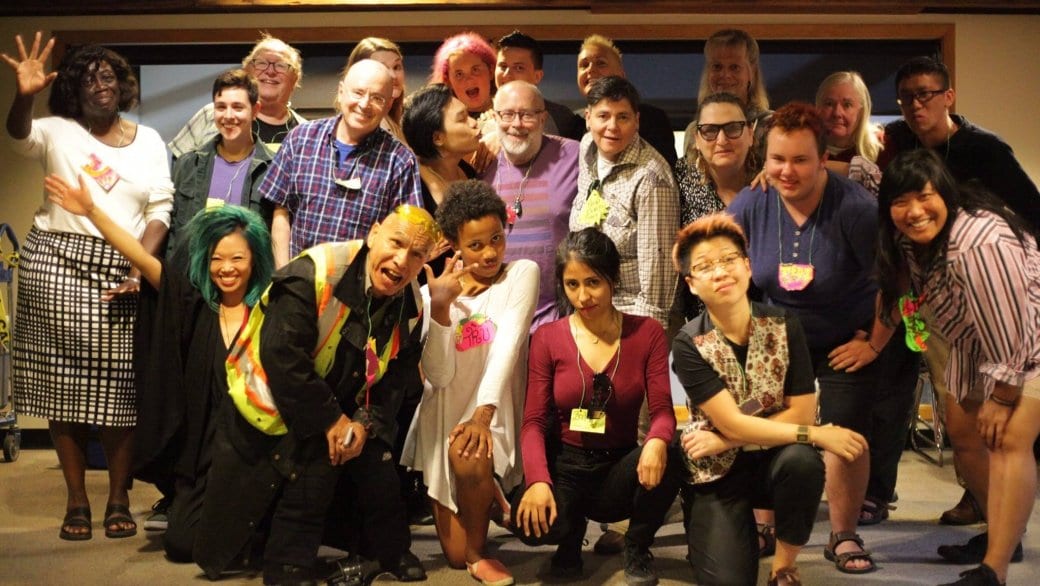As our community’s pioneers and early activists age and leave the stage in increasing numbers, for many of us the work of telling our stories and recording our history takes on a greater urgency.
Projects are launched, memories saved from the dumpster, and old stories re-examined for historical accuracy.
But to what end? Do today’s queer youth care about the ramblings of old crones and codgers? I think they do.
One thing I’ve discovered here these past few years, while serializing my potted memories of the gay scene in the 1970s, is that young queers are actually very interested in their history — and they do identify it as theirs.
Those old stories give them a sense of connection that every young person wants and needs, be it to family or community.
In recent years there have been a number of intergenerational projects organized to bring young queers and their elders together to listen to and mutually learn from one another.
This year the Vancouver Queer Film Festival partnered with Reel Youth, a youth empowerment filmmaking program, to match aspiring young Vancouver filmmakers, ranging in age from early teens to mid-20s, with elders. The project was titled Troublemakers to honour the groundbreaking troublemaking of the short films’ subjects.
Featured in the three to four minute documentaries (filmmaker in brackets) are: educator Mary Bryson (Bodhi Bravo); trans activists Sandy-Leo Laframboise (Teddi Lake), Kimberly Nixon (Tru Wilson), and Bon Fabian (Wen Tsai); Vancouver Gay Liberation Front co-founder Gordon Hardy (Ripley Burton); Little Sister’s bookstore’s Janine Fuller (Zeila Fernandez); lesbian community’s Sadie Kuehn (Brea May); First Nations activist Stephen Lytton (Morgan Strug); Coming Out radio show and Angles newspaper co-founder David Myers (Andrew Ng); and drag artist Reg Manning, aka Vancouver Empress II Mona Lee (Leroy Wan).
The group met for two intense six-hour days last June, and the results include new friendships that span generations and 10 heartwarming interviews with Troublemakers who continue to have an impact. The second day of filming coincided with the horror of the Orlando shootings, which had its own effect on the tenor of the storytelling and the bonding among the participants.
The resulting films, screened Aug 15 at the festival, are personal, sometimes intimate, and always celebratory.
In conversations I had with some of the Troublemakers in advance of the evening, and during the post-screening Q&A moderated by lesbian lawyer barbara findlay, a few recurring themes emerged.
The filmmakers and their subjects expressed, in different ways, a commitment to telling and recording our stories and getting them out to the wider community. A founding principal of the Coming Out show, Myers noted, was to ensure “that nobody anywhere would think that they were alone, and the only one like them.”
Both Kuehn and Fuller touched on the unfortunate fragmentations that emerge in our community from time to time, and the need to heal those divisions. Both mentioned the need to talk about our disagreements with an “open heart” and from a position of compassion and acceptance.
“We need each other,” Kuehn said, “it’s as simple as that.”
“The biggest thing for me was to learn how to respond to oppression with compassion,” Strug said, when asked what they’d learned from the project.
Wan reflected on learning the value of being “honest with yourself” as a filmmaker when telling someone else’s story.
“To discover that ‘non-binary’ has been part of the discussion since the ’80s and isn’t just some new thing for millennials,” was Bravo’s takeaway from the experience.
One of the most unexpected responses came from 72-year-old Vancouver Empress II Mona Lee, appearing in his real-life persona as Reg Manning. Manning has been very outspoken in public forums about his dislike for the word “queer” and has previously maintained that it was a pejorative that couldn’t be redeemed.
But Monday night he was able to say, “I finally understand what they mean now by ‘queer’ and why identifying as queer is as important to this generation as identifying as ‘gay’ was to mine.”
Yes, when we listen with an open heart we can change.
Laframboise’s parting shot was a reminder that there is indeed more learning and more calling in to be done. “Know that LGBTQ is still white privilege,” she stated. “It’s not aboriginal, and we need to keep knocking on the door and knocking down the door to claim our place!”
There was something a bit incongruous about this assertion, given the evident diversity among both the audience and the project participants. I’d venture to say that, despite work still to be done, queer arts and other community organizations are light years ahead of their mainstream equivalents in reaching inclusivity goals. A conversation for another day.
Fuller’s final comment in her documentary I hope sums up something that all the Troublemakers can agree on. “I have complete and utter faith in the queer youth.”
And as project coordinator Mutya Macatumpag observed at the conclusion of the evening, “we’re all troublemakers at heart!”
See for yourself at reelyouth.ca/troublemakers-2016.html.
Read all our 2016 Vancouver Queer Film Festival coverage:
A Filipino family’s coming out story
What happened to the gay dancers who toured with Madonna?
Re:Orientations: What does Asian Canadian queer identity look like today?
Chemsex: sensationalist film or useful warning?
In particular, barbara findlay: Meet Vancouver’s pioneering lesbian lawyer
How a Beyonce concert in Brazil helped build queer community
Why four Latina lesbians were accused of raping children
Aligarh rooted in India’s flip-flop on gay rights
Can a gay man be attracted to a bisexual woman?
Two Soft Things, Two Hard Things uncovers LGBT Inuit history
And our paid sponsored content, written by the Vancouver Queer Film Festival:
Top picks for queer flicks at Vancouver Queer Film Festival 2016
The steamiest scenes at the 2016 Vancouver Queer Film Festival

 Why you can trust Xtra
Why you can trust Xtra


